Stay ahead of the curve as a political insider with deep policy analysis, daily briefings and policy-shaping tools.
Request a DemoState agencies are bleeding staff and seeking younger workers

The Department of Natural Resources is seeking more game wardens to keep hunters, hikers and boaters safe and on the right side of the law. (Credit: Department of Natural Resources)
Job turnover among Georgia state employees is at an all-time high — 26%, leading to compromised services in some departments, heavier workloads and more stress for the remaining employees.
State officials are trying new ways to draw people into public service and to keep them longer.
What’s Happening
The Georgia Fiscal Year 2022 Workforce Report, which ran through the end of June 2022, shows the continuation of a six-year trend: More than 20% of the state’s workers are leaving their jobs.
Georgia had a staffing gap — new hires minus terminations — of 1,891 workers last year, and is down 12,100 workers over the past 10 years.
Certain departments are hurting more than others. Juvenile justice, corrections and driver services saw more than 40% turnover, while more than a third of workers in social service, child welfare and behavioral health departments quit their jobs.
Public safety and transportation jobs were more stable, with 15% and 17% turnover, respectively. The reasons that people are leaving public service jobs are varied; some tied to the challenging nature of the work, and some the result of market forces and long-term demographic trends.

Prison guards, juvenile detention and child welfare workers have heavy caseloads and not enough resources, which can lead to burnout, said Al Howell, deputy commissioner of the Human Resources Administration in the Department of Administrative Services (DOAS).
Child welfare work is particularly challenging and stressful. “The pay is low, and we hire young folks who may not know what they’re getting into, and many find it hard and heart-breaking,” Polly McKinney, advocacy director for Voices for Georgia’s Children, a child advocacy organization. “People they're trying to help are complicated, and even when they’re successful, it can provide secondary trauma to the case workers.”
Juvenile detention officers, who earned a starting salary of $37,700 last year, have an “insanely high” turnover rate, McKinney said. In 2022, that was 96% for entry level staff, and 73% for all juvenile corrections officers, according to the Department of Juvenile Justice annual report.
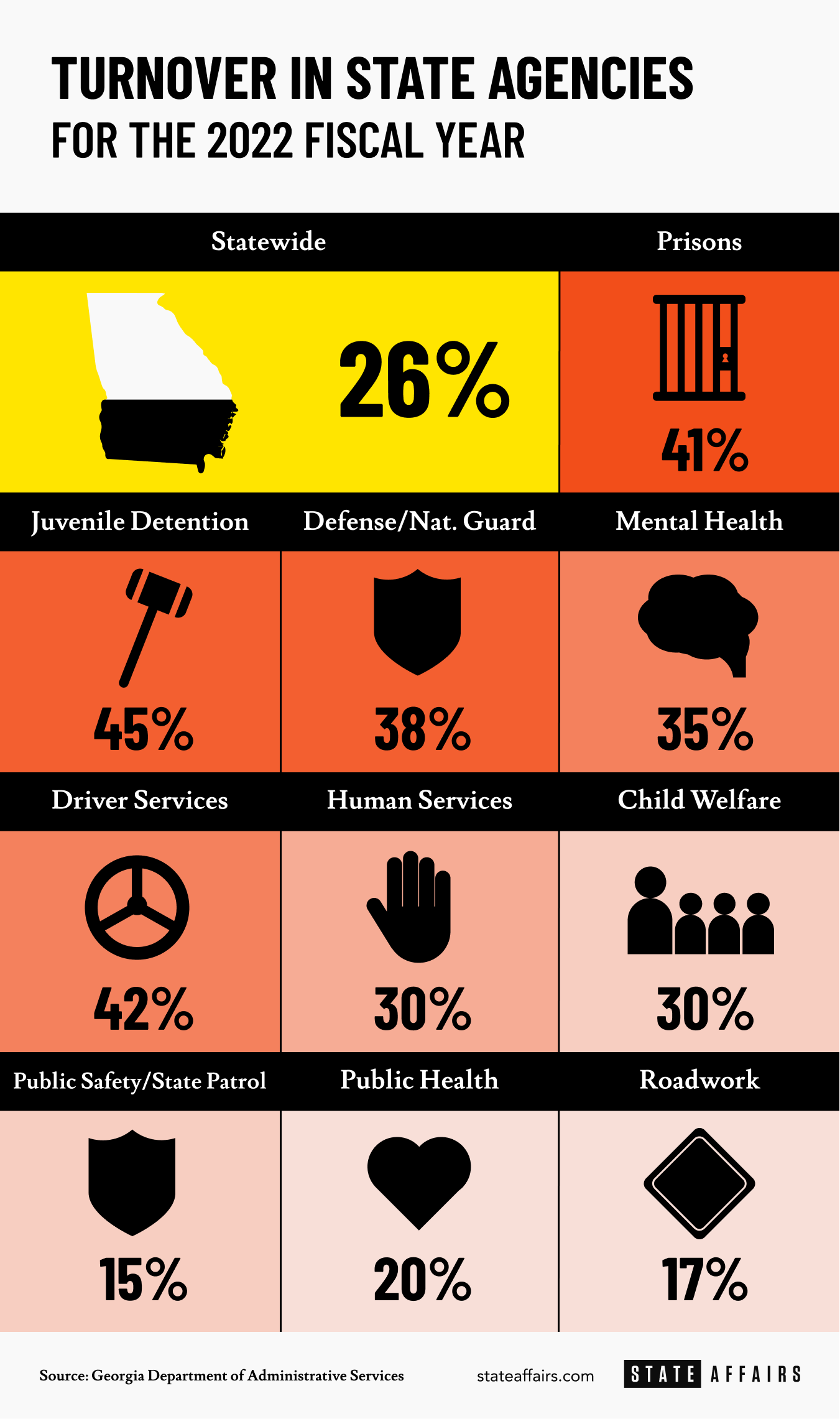
The private sector pays better, Howell said. He’s hopeful that the $5,000 cost of living increase for most (84%) of the state’s 68,000 employees approved by the Legislature last year, along with the $2,000 increase in fiscal year 2024, will make people feel “more valued,” and help turn the tide of terminations.
Another challenge facing state employers is the aging state workforce. Many older employees are nearing retirement age. About 9% of 61,400 executive branch employees will likely retire within the next year, and 20% may retire in less than five years, according to the workforce report.
The state is working to recruit people of younger generations. Millennials, also known as Generation Y or “digital” workers (age 25 to 41), who now make up a third of the U.S. labor force, represented slightly more than half of new state hires last year, and Generation Z (24 and younger) represented 13%.
But many of them didn’t stick around. The turnover rate was 28% for millennials and 47% for Gen Z.
“They tend to stay less than 12 months, the ones that do leave,” said Howell. “And that's disturbing, because they make up about 40% of our workforce.”
The Department of Administrative Services is trying to figure out what’s making younger workers leave so quickly, and what will motivate them to stay longer.
“Gone are the days when people will stay 10, 15, 20 or 30 years,” Howell said. “The average tenure now is about four years. So when we talk about retention, we're not talking about trying to come up with strategies to keep people for double-digit years. We're trying to think of ways to keep them one, two, maybe three years longer.”
Why It Matters
The heavy churn in some departments inevitably means poor service delivery.
Child and Family Services workers frequently say they are swamped and struggling to keep up with child abuse and neglect cases.
Last December, The Atlanta Journal-Constitution reported that the state’s child welfare ombudsman wrote a letter to Child and Family Services Commissioner Candice Broce identifying “15 systemic breakdowns” within the agency and alleging that its workers “are no longer adequately responding to child abuse cases.” The AJC investigation found that the department’s caseworkers “are leaving their jobs in droves, fueled by low pay, frustration with leadership, and exhaustion from increased workloads, according to state human resources reports.”
When thousands of people waited weeks to receive their Supplemental Nutrition Assistance Program, or food stamp benefits, last November, DHS blamed the delay on “inflation and workforce shortages,” saying it was taking its reduced staff longer to process a higher volume of cases.
Violent fights, untreated medical issues, deaths and suicides among people incarcerated in Georgia prisons have increased in recent years. Many prison guards quit because they feel outnumbered and unsafe, further perpetuating the problems faced by the remaining corrections personnel.
Even departments with seemingly less built-in stress, such as Driver Services, are seeing high (42%) turnover. The department has lost over half its customer service staff since 2018, including the ride-along driver examiners, who conduct license tests for new motorists and commercial truck drivers. Last year, Driver Services pivoted to self-service license renewal kiosks, which has helped ease long wait times in the department’s offices.
What’s Next
Georgia isn’t the only state struggling to keep employees.
According to a national 2022 survey of local and state government employees by MissionSquare Research Institute, a nonprofit research firm, 41% are considering changing their jobs in the near future. The majority — 64% — are “extremely worried or very worried about inflation making it hard to keep up with the current cost of living.”
Among those state workers who were considering changing jobs, the top reasons included desire for better salary and benefits, more job satisfaction and work-life balance, and feelings of burnout, said Joshua Franzel, the managing director of MissionSquare.
Government agencies are facing the same retention issues as private sector employers – younger generations don’t expect to stay with an employer for life, or even for very long, said Franzel. The lure of the public sector, historically, has been that while salaries can’t compete with the private sector, government jobs offer more generous retirement and health benefits, he said. But younger workers, who tend to be healthy and not yet thinking about retirement, place more value on other aspects of the work.
That includes how meaningful the work is, said Franzel. Another survey of recent college graduates entering public service jobs showed that “top of the list for them is meaningful work and mission alignment with the organization,” followed by workplace culture, he said. Compensation and benefits came in third.
So state employers, who may not be able to wow applicants with compensation packages, “should emphasize the accomplishments you can take pride in by taking on a public service role,” said Gerald Young, a senior policy analyst with MissionSquare. “And they should message it in a way that resonates with that audience.”
Georgia has made some headway on compensation. The $5,000 cost of living adjustment salary increases for Georgia state employees in FY 2022 bumped the median executive branch salary to $34,185, up 10% over the previous year, and the median salary for state workers overall rose to $44,637, a 15% increase. And a $2,000 salary increase will show up in paychecks starting this July. Some law enforcement officers will receive an extra $4,000.
The Department of Administrative Services conducted a “midterm snapshot” looking at workforce data from July 2022 (when the $5,000 cost of living adjustment kicked in) to January 2023, and found that new hires exceeded separations for the first time in five years, with a net gain of about 1,000 workers. Howell said if that trend continues, turnover by the end of FY 23 may drop to 21%.
“So we may see some relief for this hole-in-the-bucket syndrome, where more people are leaving than are hired,” he said.
State agencies are also working on developing savvier ways to connect with potential public service workers, such as developing campaigns on social media, digital billboards, mass transit and radio.
In an Instagram ad featuring a Georgia State Patrol car rolling down the road, its swirling blue lights a beacon on a dark, foggy night, potential state troopers are invited to “Be The Light In The Darkness.” Facebook and TikTok reels also emphasize the “0 to 120” miles per hour capabilities of the patrol’s sporty new 2022 Chevy Camaros, which make it easier to catch up to speeding vehicles. All the ads lead to a web page to sign up for the next trooper training class and a $56,350 starting salary.
Pounding rock music and quick cuts of Department of Natural Resources workers four-wheeling in the woods, rescuing stranded hikers in the mountains via helicopter, zooming along lakes in speed boats and pursuing various ne’er-do-wells with sniffing dogs, feature in this recruitment video, which asks, “Do you have what it takes to be a Georgia game warden?”
Howell, of the Department of Administrative Services, said, “There's kind of a negative public image about law enforcement, rightly or wrongly, that's out there. And being able to overcome that, and change that, there’s a lot of discussion and work around that right now.”
In recognition that “we can’t address all the jobs and problem areas,” he said the state is focusing first on five key job areas: law enforcement, information technology, social services, accounting and procurement.
DOAS is partnering with the Department of Education, the Technical College System of Georgia, the University System of Georgia and the Carl Vinson Institute of Government on a new Workforce Strategies Initiative to better understand why workers are leaving, and to develop more effective recruitment and retention strategies.
One outcome so far: six agencies in Georgia employ law enforcement officers, and now they’re collaborating on recruitment instead of competing against each other, said Howell. They’re doing joint job fairs and sharing data and insights on applicants.
In an effort to expand the overall applicant pool, DOAS is examining whether a college degree is necessary for about 1,400 state jobs. Only 28% of Georgians over the age of 25 have a bachelor’s degree or higher, according to the U.S. Census Bureau.
“We’re looking at what people achieve through experience; maybe it’s through the military, maybe it’s through technical school, maybe it’s on-the-job training,” Howell said.
The state is also looking at alternative pathways to qualify people for tech jobs, such as certifications from Google, Microsoft and a variety of technical schools and programs.
Senate Bill 3, the Reducing Barriers to State Employment Act of 2023, which passed last session, empowers the agency to make those changes. Georgia joins eight other state governments that have similarly reduced job requirements, including Maryland, Ohio, Utah, Colorado, Pennsylvania, Alaska, North Carolina and New Jersey.
The human resources staff at DOAS is also encouraging state agencies to fast-track promotions and raises for deserving workers “to provide them with a sense of career progression,” said Howell.
As they try to adopt private sector practices, Georgia government agencies must find more ways to change their slow and lumbering bureaucratic ways, say HR experts.
What most turns off millennials and Gen Z job seekers from entering the public sector is “the longer hiring process and decision timeline,” said Franzel.
He has one suggestion in particular for the state of Georgia: Use a mobile app for hiring.
Do you have insights, tips or questions about working for state government? Contact Jill Jordan Sieder on Twitter @JOURNALISTAJILL or at [email protected].
Twitter @STATEAFFAIRSGA
Instagram @STATEAFFAIRSGA
Facebook @STATEAFFAIRSUS
LinkedIn @STATEAFFAIRS
Check out who's hiring in state government.
Related:
Header image: The Department of Natural Resources is seeking more game wardens to keep hunters, hikers and boaters safe and on the right side of the law. (Credit: Department of Natural Resources)
Read this story for free.
Create AccountRead this story for free
By submitting your information, you agree to the Terms of Service and acknowledge our Privacy Policy.
Incumbent candidates for local, federal races likely to be no-shows at this weekend’s primary debates
ATLANTA — One of Georgia’s prominent media organizations is pleading with incumbent state and congressional candidates to participate in its primary election debates slated for Sunday.
For the first time in The Atlanta Press Club’s 30-year debate history, incumbents facing challengers in the May 21 primary have either declined or not yet committed to participating in the organization’s well-known debate series. The possible no-shows include candidates in four Congressional races as well as the Georgia Supreme Court, and the Fulton County District Attorney races.
“This is the first time that we’ve had so many [incumbents] not participate,” debate organizer Lauri Strauss told State Affairs. Strauss declined to speculate why candidates aren’t participating.
Hoping to encourage more participation, the organization issued the following statement:
“The Atlanta Press Club believes it is the responsibility of people running for public office to answer questions from their local media that will help inform voters before they cast their ballots. If a candidate is running for public office, the candidate should be willing to participate in the democratic process, which includes attending debates and fielding questions from journalists and opponents.”
Candidates have until Friday to RSVP.
Strauss said candidates who fail to appear will be represented on stage by an empty podium during the debate.
District Attorney Fani Willis has declined to participate and Democratic U.S. Reps. Lucy McBath and David Scott have yet to RSVP. Strauss said the organization is still in talks with Georgia Supreme Court Justice Andrew Pinson’s staff about his appearance in the debate.
Willis, declined earlier this week to participate, citing constraints around talking about sensitive cases like the criminal prosecution of former President Donald Trump.
McBath currently represents the 7th Congressional District and is now running in the newly drawn 6th Congressional District against two Democratic challengers, Jerica Richardson and Mandisha Thomas. McBath declined to participate in the press club’s general election debate in 2022, forcing her Republican challenger Mark Gonsalves to debate with an empty podium. McBath won with 61% of the vote.
The debates will air live on April 28 on GPB.org, on The Atlanta Press Club’s Facebook page (www.fb.com/TheAtlantaPressClub). It will be rebroadcast in early May on WABE.org.
| Race | Tape and Livestream Sun. April 28 |
GPB-TV Broadcast | WABE Broadcast |
| Congressional District 6 Democrats | 10:00 a.m. | April 29 at 7:00 p.m. | May 1 at 4:30 p.m. |
| Congressional District 13 Democrats | 11:15 a.m. | April 28 at 4:00 p.m. | May 1 at 5 p.m. |
| Congressional District 3 Republicans | 1:00 p.m. | April 28 at 5:00 p.m. | May 2 at 3:30 p.m. |
| Congressional District 2 Republicans | 3:00 p.m. | April 29 at 5:00 p.m. | |
| Georgia Supreme Court | 4:45 p.m. | May 2 at 4:30 p.m. | |
| DeKalb County CEO | 5:45 p.m. | May 2 at 5:15 p.m. | |
| Fulton County District Attorney | 6:45 p.m. | May 1 at 4 p.m. |
Have questions or comments? Contact Jill Jordan Sieder on X @journalistajill or at [email protected] and Tammy Joyner on X @lvjoyner or at [email protected].
And subscribe to State Affairs so you do not miss an update.
X @StateAffairsGA
Instagram@StateAffairsGA
Facebook @StateAffairsGA
LinkedIn @StateAffairs
‘It is nothing short of insane:’ Bill to criminalize squatting signed by governor
ATLANTA — Today Gov. Brian Kemp signed legislation criminalizing squatting, the illegal practice of entering and residing on someone else’s property without their consent.
The Georgia Squatter Reform Act makes squatting a misdemeanor criminal offense, punishable by up to a year in jail, a $1,000 fine, or both. It also speeds up the timeline to evict a squatter, giving landlords and law enforcement more tools to establish that someone is trespassing and to demand that they leave.
“It is nothing short of insane that there are some who are entering other people’s homes and claiming them as their own,” Kemp said in a post on X after signing the bill at the state Capitol. “Thanks to our legislative partners, I was proud to sign HB 1017 — once again making it clear that illegal squatters are criminals, not residents.”
Over the past few years, squatting has become more prevalent in Georgia, with trespassers breaking into vacant homes, claiming tenancy and refusing to leave.
A 2023 survey of institutional investors in single-family rental homes who are members of the National Rental Home Council found there were 1,200 illegally-occupied homes in and around Atlanta. Realtors told State Affairs they’ve encountered squatters in homes for sale and rent in Gainesville, Valdosta and Albany.
Until now, law enforcement in many jurisdictions treated the issue as a civil matter, telling property owners to file eviction actions in court, which could take months or even years to resolve.
The new law directs local law enforcement to issue citations and arrest people accused of squatting if they don’t provide a valid lease or proof of payment within three days. If they do produce such documents, it moves eviction proceedings to magistrate courts, and requires cases to be heard within seven business days after filing.
If the judge deems documents they present to be forged or fake, those accused of squatting could be charged with a felony. And judges can impose more fines based on the fair market value of rent that landlords lose.
On hand in the governor’s office for the signing was Rep. Devan Seabaugh, R-Marietta, the lead sponsor of the bill.
“Currently in Georgia law, we’re giving squatters tenant rights,” Seabaugh previously told State Affairs. “And my bill would take that away. It basically says, ‘You’re an intruder, you’re a criminal, and we’re going to treat you like a criminal.’ ”
Read these related stories:
Have questions or comments? Contact Jill Jordan Sieder on X @journalistajill or at [email protected]
And subscribe to State Affairs so you do not miss an update.
X @StateAffairsGA
Instagram @StateAffairsGA
Facebook @StateAffairsGA
LinkedIn @StateAffairs
State troopers are stretched to fight drugs and curb highway deaths
ATLANTA — When Cpl. Anthony Munoz straps on his bullet-proof vest each day and pulls out of the Department of Public Safety headquarters in Atlanta, Munoz never knows how his shift will unfold. What is for certain is that the traffic — of cars, criminals and contraband — is constant.
And what is also true is that there are not nearly enough state troopers on the road to catch them all.
A 13-year veteran, trooper Munoz, 45, is part of the department’s Criminal Interdiction Unit, whose main focus is suppressing the robust illegal drug trade flowing through Georgia. Last year the eight-member team made 1,309 arrests, including 76 felony drug arrests, and helped other agencies seize $24 million worth of contraband.
In 2019, the unit had 25 members.
Capt. Greg Shackleford, the troop commander, said that in 2020 the unit was split up and half the team was sent to Georgia State Patrol posts around the state, which were hurting for staff, to conduct the Department of Public Safety’s core functions — traffic enforcement and responding to car crashes.
The split has translated into Munoz and the rest of his team now spending most of their time monitoring Interstate 20 just south of Atlanta, and Interstate 75/85 west of the city. He said they regularly support the investigations and busts of other local and federal agencies, and frequently join the governor’s crime suppression details, which have included taking down car thieves and street racers.
All this leaves his team with less time to develop intelligence on their own drug cases and to snare more traffickers. It also means the troopers no longer have time to monitor roads in rural areas in south Georgia where, Shackleford said, many drug traffickers driving trailers full of drugs and contraband enter the state on highways coming from Florida and Texas and now ride around unchecked for hundreds of miles.

Chronically understaffed
The Georgia State Patrol remains chronically understaffed. While the state’s population has grown, and with it the number of motorists, car crashes and criminal activity, the number of state troopers has hovered stubbornly between about 750 and 850 for over a decade, giving Georgia the unwanted distinction of having lowest number of troopers per capita in the country.


The average number of state troopers per capita in the U.S. is 21; for Georgia, it’s eight. And the outlook for changing that is not great, Col. William “Billy” Hitchens, the public safety commissioner, told legislators during hearings last fall — Unless the state makes bold moves in improving compensation. He said Georgia State Patrol has “aimed to reach 1,000 troopers for as long as I have been employed,” which is 30 years.
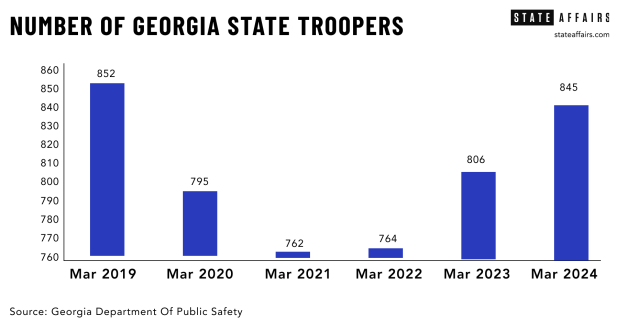
The state saw its trooper numbers plummet to 745 during the pandemic in 2021. The agency is now back to 845 troopers. The current trooper school started with 61 candidates, and if recent history is a guide, about 70% will graduate in September and put on the badge.
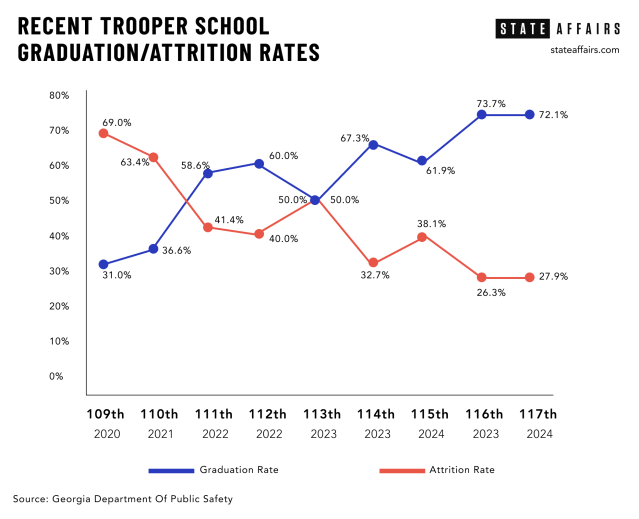
While “things are moving in the right direction” this year in terms of recruitment, said Hitchens, he said too many veteran officers are either resigning or retiring early.
Between 2018 and 2023, 48 troopers left the agency on a full-service retirement, meaning they had served for 30 years. During the same period, 341 troopers resigned, retired early or departed for other reasons. As it costs the department $153,397 to train a trooper, those who left early cost the state $52 million, said Lt. Col. Josh Lamb, director of administrative services for the Department of Public Safety.
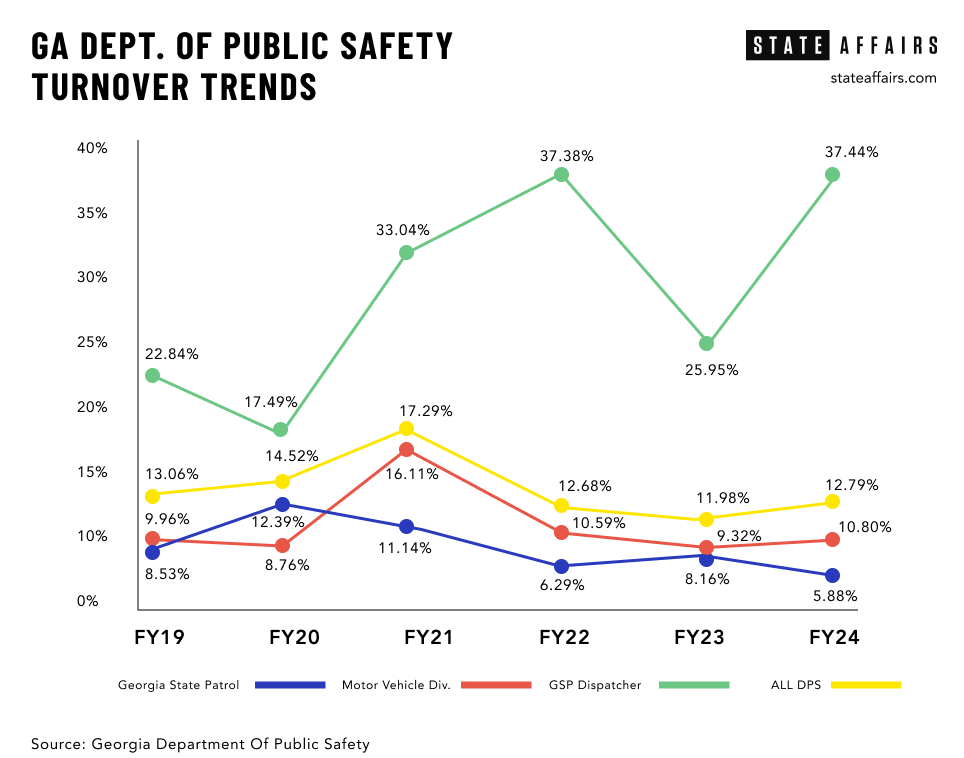
Fewer troopers means more highway deaths
Fewer troopers on the state’s roads impact everyone, say law enforcement officials. .
“As our trooper strength decreases, traffic fatalities increase,” said Hitchens.
National Highway Traffic Safety Administration data shows a direct inverse relationship between trooper staffing and the number of fatalities in Georgia. At its low ebb in 2021, with 769 troopers, 1,925 people died on Georgia roads. More recently, in 2023, with 820 troopers, Georgia saw 1,647 fatalities, an 8% decrease over 2022.
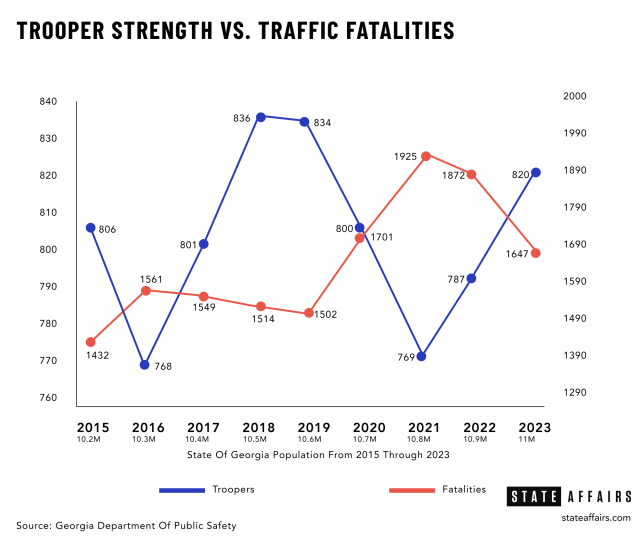
“We are concerned with traffic patterns, the way people drive, and we enforce the law out there,” Hitchens told State Affairs. “When you start losing personnel, whether it’s the state, or cities and counties, one of the first things that may be taken away is traffic enforcement. Because they’re responding to other calls — robberies, domestics, you name it. And when troopers stop doing it, there are just fewer people out there reminding you, ‘Hey, that’s dangerous. Slow down.’ ”
The state patrol wrote 408,574 citations to motorists last year, but issued even more warnings — 510,265. Hitchens noted that mere trooper presence on the highway is a strong deterrent.
“It doesn’t have to be you that gets stopped,” he said. “Those 50 cars that ride by during that time and see that patrol car, go ‘Ooh, I don’t have my seatbelt on … I’m playing with my phone,’ and it just impacts that behavior. But the less officers you see on the road, the less you have people changing their driving behavior.”
Along with encouraging safer driving, DUI enforcement has become a higher priority for the department. A “Nighthawks” squad of 22 officers patrols after midnight in areas of the state where data analysis shows high incidences of alcohol and drug-induced crashes and violations. The state patrol made 16,409 arrests for driving under the influence in 2023.
Hitchens said the work of such special units is compromised when they’re pulled into other duties due to statewide manpower shortages. The three Nighthawks units, for example, are often pulled into other traffic stops and crime suppression details in Atlanta, Macon and Columbus. And drug interdiction officers have had to cover vehicle crashes and multiple public protests over the Atlanta Public Training Center (dubbed “Cop City”) and, more recently, conflict between Israelis and Palestinians in Gaza.
Besides securing troopers, Hitchens said the department is struggling to recruit dispatchers, who are the lifeline for troopers and officers who patrol alone and depend on dispatchers to provide critical information quickly. Today, the department has 129 dispatchers who work at nine regional call centers. They need 169 to be fully staffed.
A tough sell in the ‘Cop City’ era
Hitchens told lawmakers that heightened public criticism of law enforcement over the past few years has played a role in the department’s ongoing challenges to recruit and retain officers.
“People without understanding of what it’s like to be involved in a rapidly evolving life and death situation started scrutinizing officers, cities started defunding their police departments while demanding greater accountability and more training, both of which cost money,” he said. “Following the George Floyd, Rayshard Brooks and Breonna Taylor instances, the media and some leaders in our community nationwide began to demonize the police.”


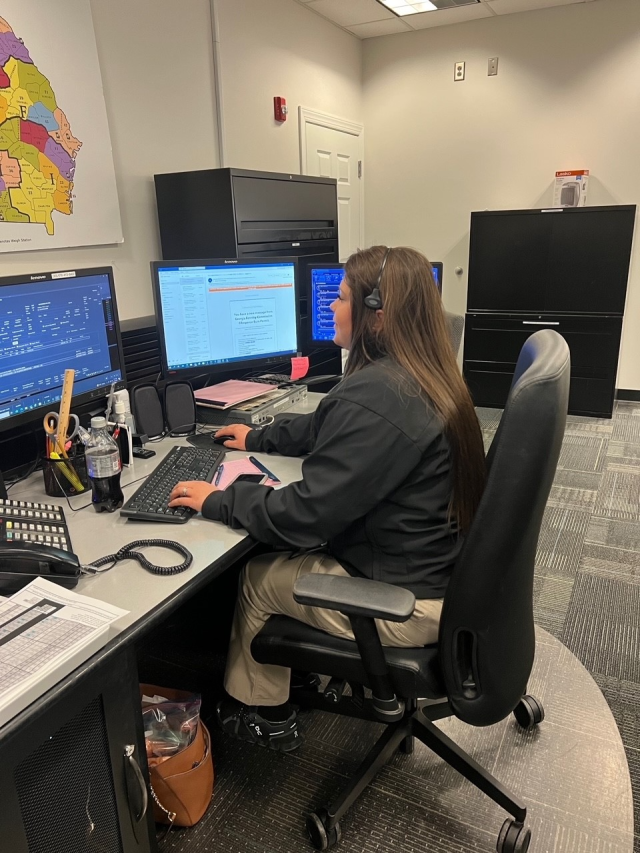
Hitchens said that since the death of Manuel Teran, a protester against the planned Atlanta Police Training Center who was allegedly shot by a Georgia trooper during a firefight on the forested property in 2023, and the sometimes violent public demonstrations that ensued, “that dynamic just got worse. For a long time with ‘Cop City,’ it was constant protest, and you know, that weighs on you.”
Munoz, who was patrolling with other local law enforcement on the perimeter of the training center site the day Teran died, said the public’s jaundiced view of that episode and other recent struggles between police and citizens that have gone viral on social media can be frustrating.
“I know that a lot of the narrative out there is not true at all,” he said. “There are millions and millions of police encounters every day. And those [violent] ones are fractions of a percent of incidents, and whether a trooper or officer responds the right way, it all boils down to compliance. If you just comply, you’re presumed innocent, you’ll have your chance to make your case, and the facts will come out. Don’t argue, don’t fight, don’t resist. We don’t want to fight you.”
Noting that he has a wife and four children he wants to come home to, Munoz said, “We’ve been pounded with de-escalation in training, and that’s what we practice. I’m sure there are officers out there now that freeze and that say, ‘Do I do my job? Or am I going to be put in prison, because I reacted in a certain way?’ So we do carry that, and it’s a heavy, heavy burden.”
Last year three House Democrats introduced House Bill 107, the Police Accountability Act, which proposes an end to qualified immunity for law enforcement officers and would have required body-worn cameras for all peace officers. The bill did not advance out of committee, but Hitchens said taken together with the public unrest and anti-police sentiment since 2020, it all had a demoralizing effect on his officers.
“All of these factors are forcing officers to become fatigued with our profession,” he said. “They feel that support is ending and the job is not worth the risk.”
According to the Georgia Peace Officers Training and Standards (POST) Council, the number of officers with basic council certifications in Georgia dropped to 5,956 in 2023 from 6,666 in 2017.
“I don’t think there’s a single law enforcement agency in Georgia that is fully staffed,” said Chris Harvey, deputy executive director of Georgia POST. “And they have a very hard time getting qualified people on board. … There just aren’t enough quality people that are interested in doing this job.”
While some agencies have raised salaries and added signing bonuses, he said, “I can tell you that it’s not a solved problem. Because I don’t think it’s primarily a money issue. I think it has a lot to do with the difficulty of doing this job these days. I’m not sure it’s ever been harder to work in law enforcement. The amount of scrutiny along with the amount of violence that police officers encounter on a regular basis, they generally feel like they’re out there alone. If they make one mistake, they’re gonna pay dearly for it. … It’s a tough sell.”
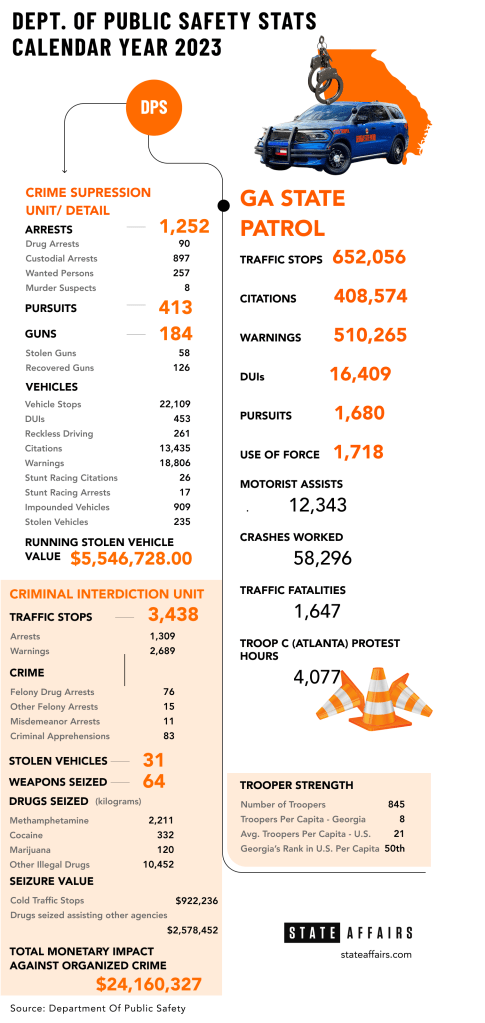
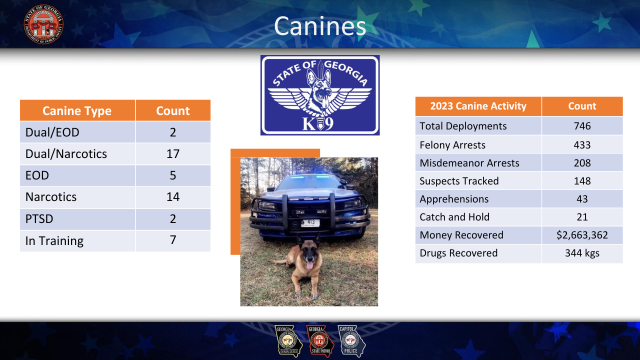
Father and son patrol leaders fight for trooper compensation
For Hitchens, his push to recruit potential state troopers and convince state leaders to increase pay and benefits for troopers is supported by an unlikely suspect — his dad.
House Appropriations public safety subcommittee chair Rep. Bill Hitchens, R- Rincon is a former trooper who served in the Georgia State Patrol for 28 years, and was later appointed by former Gov. Sonny Perdue to serve as public safety commissioner from 2004 to 2011. The elder Hitchens has served in the House since 2013.
At the House Working Group on Public Safety meeting last fall, Rep. Hitchens noted that the state patrol has maintained around 700 troopers since he joined in 1969, when the state population was about 4 million. “Now it’s 11 million people … and we have a lot more murders, stolen cars and merchandise,” the elder Hitchens said. “Where we fell down, I don’t know. It’s just we’ve never grown. … And now we’re at a breaking point.”
The younger Hitchens was appointed by Gov. Brian Kemp as deputy commissioner for public safety in 2020, and then as commissioner in 2023. As commissioner he oversees the Georgia State Patrol, the Motor Carrier Compliance Division, the Capitol Police Division, and other special law enforcement units, including the crime suppression, SWAT and canine teams.
The son and father team have successfully fought for substantial pay raises for troopers, whose salaries have increased over the past three legislative cycles by nearly $17,000. That includes a 4% cost of living increase and a $3,000 bonus for law enforcement officers approved by the General Assembly in the fiscal year 2025 budget. The starting salary for a new trooper will be $63,684 as of July 1, if the governor approves it in the budget, as expected.
Dispatchers will also get a boost in next year’s budget, with new pay step increases that can take them from a starting salary of $39,000 to up to $56,000 as they earn promotions.
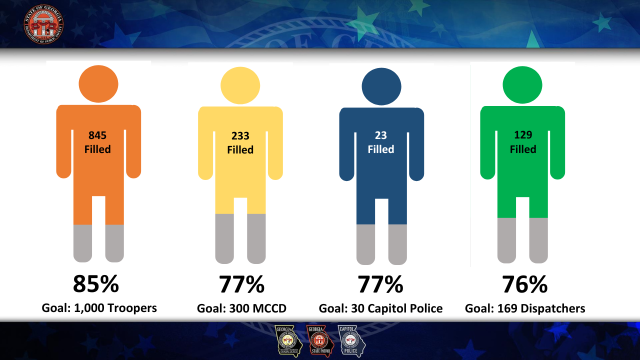
Col. Hitchens said those pay bumps seem to be turning the tide on recruitment. The number of applicants and graduates rose for the last few trooper schools held over the past year. Other changes the department made to trooper school requirements have also helped, including allowing people to go home more often during training, permitting access to mobile phones at night, and allowing people with arm tattoos to train and serve, if they cover them with long sleeves.
“We tried to make changes in training that we felt like really didn’t help people stay,” said Hitchens. “And we didn’t make it kinder or gentler. I mean, in this job that you sign up for, there’s got to be a certain level of discipline, there’s got to be a certain level of respect, with high physical training standards, that’s still there. But the things that we could change, we decided to do.”
Both men remain concerned about how to stem the trend of early retirement, and agree that sweetening the retirement package is the key way to combat it.
Currently most troopers qualify for a pension equal to 1% of their final pay for every year of service, and can also participate in a 401(K) savings plan while they serve, which the state matches up to 9%, depending on their number of years on the force. But Col. Hitchens is pushing for a more generous “defined benefit” retirement plan, with a 3% pension, which he said would double what most troopers get when they retire. Instead of earning about $25,000 a year on average, they would receive about $52,000.
Presently, the average tenure of a state trooper is 10 years, nowhere close to the 30-year careers Hitchens and other leaders want his officers to pursue.
And he knows it matters to them, as retirement benefits emerged as the number one retention issue on a recent agency-wide, anonymous survey.
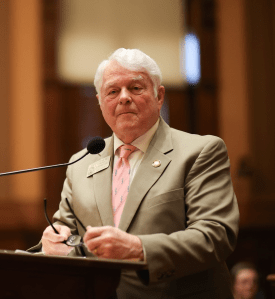

“Every other agency is increasing their hiring packages, raising pay and offering better benefits, from retirement to free health care,” Hitchens said, noting that the Atlanta and Sandy Springs police departments offer substantially higher pay and 3% defined benefit plans.
“We’re in a competitive bidding process, and we have to offer a reward that’s worth the risk our people are taking with their lives and liberty.”
The tenure of senior officers also matters because of the crucial role they play in mentoring new recruits.
“When we have our young troopers, the men and women that come into the field, they’re excited,” said Shackleford, the troop commander, who spent much of his 36-year public safety career in SWAT before taking over Troop K, which includes the crime suppression, criminal interdiction, K-9, SWAT and dive units. “They see the fast cars, they want to get into something. And the problem is, it’s just like a puppy. A puppy’s gonna get into something and make a mess. So we need the older ones to kind of calm them down and guide them a bit, show them how to see and assess a situation.”
Such role modeling of behavior, said Hitchens, “is very important, especially with de-escalation. A senior officer, having dealt with so much of that, has that confidence and the competence to carry out [their] job in a way that I think a lot of younger, less experienced officers don’t have yet. And that’s how you learn and morph over a career,” said Hitchens, adding that that transfer of knowledge and practice from veterans to recruits “benefits the public as well.”
Rep. Hitchens co-sponsored two bills related to bolstering retirement plans for law enforcement that passed out of the retirement committee during the last session. One passed in the House, but did not get a vote in the Senate. Other lawmakers balked at the cost.
Read these related stories:
Have questions or comments? Contact Jill Jordan Sieder on X @journalistajill or at [email protected]
And subscribe to State Affairs so you do not miss an update.
X @StateAffairsGA
Instagram @StateAffairsGA
Facebook @StateAffairsGA
LinkedIn @StateAffairs
In hot water with your HOA? A new law buys you time to fix the problem
The Gist
Georgia homeowners living in communities governed by homeowners’ associations now get time to fix a covenant violation before the HOA can take legal action, thanks to legislation signed into law Monday.
Gov. Brian Kemp signed House Bill 220 at the Capitol, continuing his flurry of bill-signings across the state. To date, Kemp has signed about three dozen bills since sine die, which marked the end of the 2024 legislative session, his spokesman Garrison Douglas told State Affairs. Sine die ended in the early hours of March 29. The governor has until May 7 to sign, veto or take no action on a bill. If he takes no action, the bill automatically becomes law.
What’s Happening
HB 220 requires community-governed associations to notify in writing a home or condo owner of a covenant breach — such as painting their house a color not approved by the association, and give them time to fix it before going to court or taking some other legal action.
Rep. Rob Leverett, R-Elberton, sponsored the bill which included parts of an HOA bill promoted by Sen. Donzella James, D-Atlanta. James had been trying for two years to get some HOA-related legislation passed.
While the HOA portion of HB 220 does not go as far as James’ proposed single legislation, it’s a start, she and others say.
Why It Matters
An overwhelming majority of new subdivisions being built in Georgia now will have HOAs, experts told State Affairs. In fact, new homes that are part of a homeowner association are growing fastest in the southern and western part of the United States. An estimated 2.2 million, roughly 22%, Georgia residents live in a building or home overseen by anHOA or some other type of community association, according to the Community Association Institute.
Lawmakers such as James have heard complaints in which HOAs have terrorized homeowners and threatened to take their property, all while homeowners have had little to no legal options. In some cases, homeowners have lost their homes after falling behind on HOAs fees, even if they never missed a mortgage payment.
What’s Next?
While HB 220 is now law, Senate Resolution 37 has yet to be appointed. The resolution, sponsored by James, creates the Senate Property Owners’ Associations, Homeowners’ Associations, and Condominium Associations Study Committee. Committee members will be appointed by the President of the Senate, Lt. Gov. Burt Jones.
Lawmakers appointed to the committee will delve further into HOA issues before presenting recommendations to the Legislature when it convenes in January.
See related stories:
Have questions? Contact Tammy Joyner on X @lvjoyner or at [email protected].
And subscribe to State Affairs so you do not miss any election news you need to know.
X @StateAffairsGA
Facebook @StateAffairsGA
Instagram @StateAffairsGA
LinkedIn @StateAffairs




